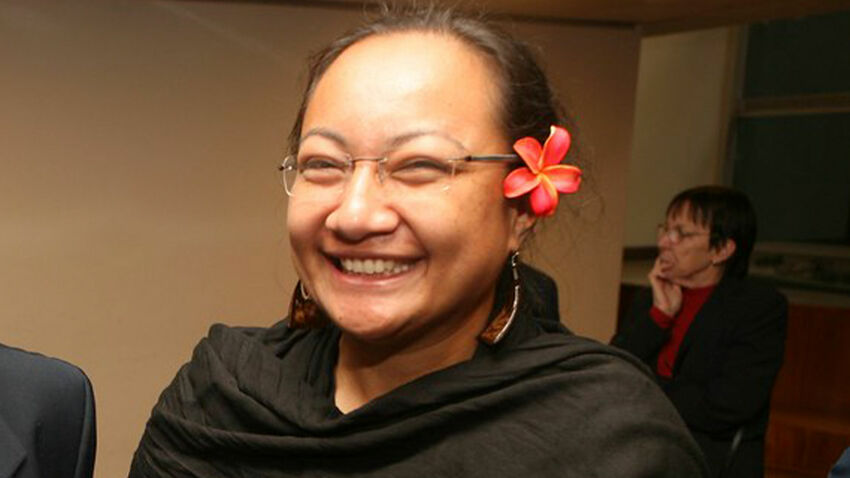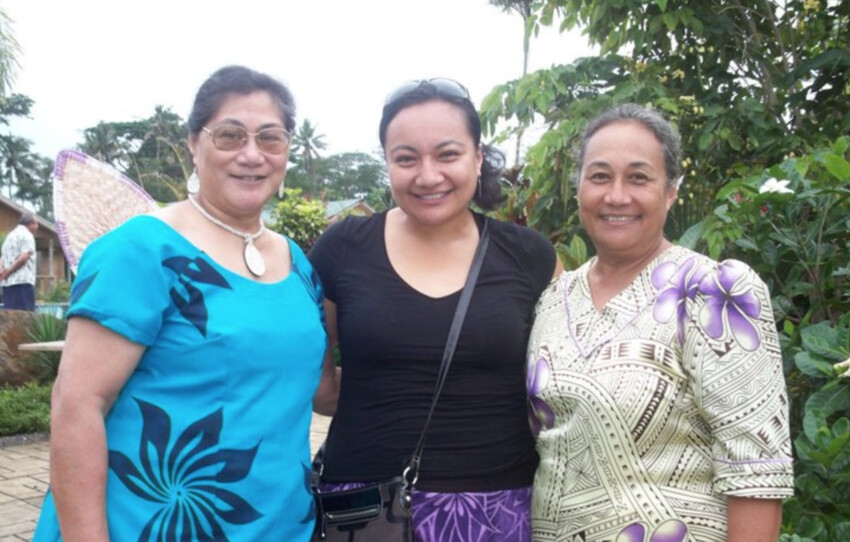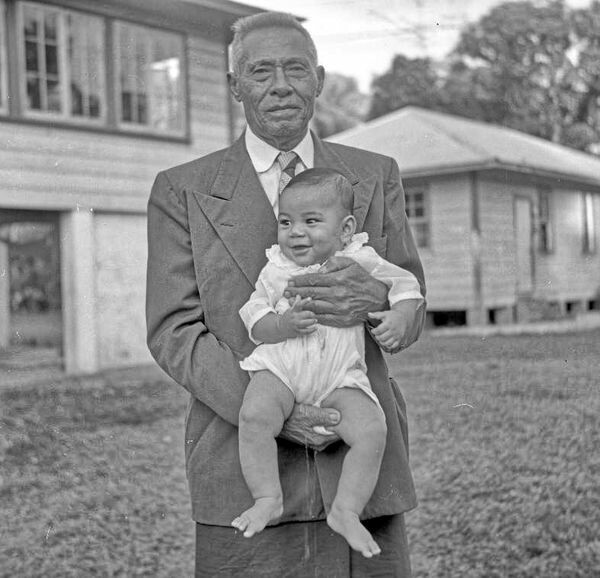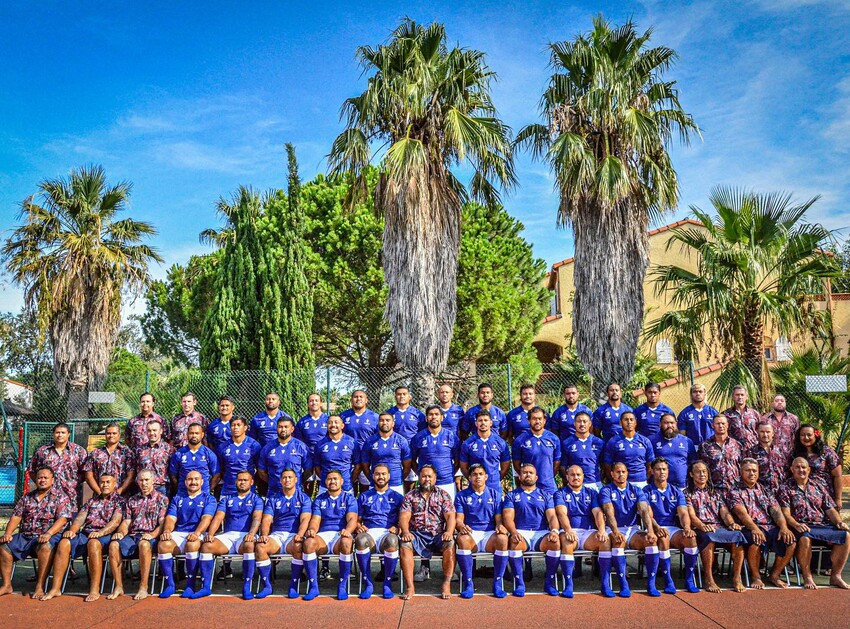Faautu Talapusi: Carrying the Torch of Rugby and Legacy

There’s a late player and captain for the Manu Samoa rugby team who died in 2005 but whose name is still mentioned with a wistful, 100 yard stare and a ‘Kalofa e’ - Samoan for ‘poor thing’ or ‘how sad’.
His name was Faitala Talapusi, Skipper as he was known in his playing days, and Rev in his latter years. He hailed from the village of Vaiala and grew up directly opposite the main entrance back then, to Apia Park.

‘Kalofa e,’ because Faitala was only 55 when cancer took him in the prime of his intellectual career as a lecturer, reverend and theologian, his playing days long in the rear vision mirror by then.
He had been the captain of the Manu Samoa rugby team in the late 1970s and CEO in 1995/6, but apart from his much admired, on-field talent, he was also a hugely intelligent, likeable character off the field, unique in his generation for his ability to lead, unite and inspire.
This, at a time in Samoan rugby when violence and on-field thuggery of the highest degree was the norm, laughingly referred to now as ‘vaitaimi o le pogisa’ - the time of the darkness before the light.
Apia Park on a Saturday would regularly see players knocked out cold by direct hits to the head every weekend. Huge brawls involving masses of players and supporters were enormously exciting, very dangerous and almost the norm.
Yet after these hard-fought matches one person stood out because, come what may, there was Faitala sharing a laugh and a word with the opposition players.

The big man’s manner was soft, humorous, totally charming and always intelligent. I can also attest to his having absolutely the most enormous calves I have ever seen on any human being, something I discovered when hanging around and given the honour of ‘ege-ing’ them - prodding/massaging them with my hands while he lay face down in the grass, in preparation before leading the famous, shield-holding, Vaiala team of the 1970s to sweet victory on Apia Park’s Number One ground.
Like all the best leaders, ‘Skipper’ Faitala could engage with the lowliest drunk in the gutter, world leaders at international congresses, and young kids like me, with equal ease and charm. 18 years after his death his name is still revered in Samoan and Pacific rugby circles.
18 years after his death his eldest daughter Faautu Talapusi is continuing her Dad’s proud legacy as part of the senior management to Manu Samoa and responsible for media, communications and logistics. Having just completed her Masters in International Development, she has moved back to Samoa and hopes to work in Samoa after the Rugby World Cup.

Her latest managerial role is no easy task and the team have now been on the road together for nine weeks and the logistics of the constant travel and hotels merry go round is a non-stop grind. Many would be reaching for the bottle, or the medicine bag to keep them going. Fortunately, Faautu has something mindful, in the form of a sweet stroll down memory lane, to ease the pain. The team’s base, in Montpellier, southern France, has stirred some precious memories for the 42 year old.
As a child she spent three years of her life there, as her late father took up a scholarship to do his PhD in Theology.
‘One morning I got in a cab and went to the old building where we’d lived on the 5th floor, overlooking our school.’
‘It brought back great memories, just remembering times when we did stuff as a family as we always used to do. It’s where he took us to the local markets, hand in hand, where he taught me to ride a bike and where I had my first piano lessons and obviously where I learnt French.’

‘I’m at the stage now where I don't feel the sadness so much, it’s more nostalgia, with a smile.’
‘It sometimes feels like he’s nudging me forward to continue what he would have loved to have been a part of.’
'Dad instilled a passion for rugby in all of us and so it’s all in remembrance of him. We love rugby because of him but we love it also in honour of him.’
Father and daughter shared three languages: Samoan, English and French and their gift for languages is no surprise considering their ancestry.
Faautu’s great grandfather, you see, was I'iga Pisa, a leader of the non-violent, Samoan, resistance movement, Mau a Pule. Under German rule in Samoa he and other leaders were exiled to Saipan in 1909.

I'iga was the should-be-a-Hollywood-blockbuster-movie-character who escaped the island by paddling a dugout, outrigger canoe, 12 inches wide and 12 inches deep, to Guam, a mere 219 kilometres away. Oh yeah, and he lost his paddle some 70 kilometres from his destination. Huge seas, sharks and a very dangerous etcetera, this was the act of an extremely fit and able person but why undertake such madness in the first place?
Put simply, languages. You see, I'iga had already learnt German but calculated that with Germany losing World War I and Samoa therefore coming under New Zealand rule, Shakespeare's language would become a necessity if he was to make a successful return from exile, and the United States controlled Guam was just the place to acquire the english language.
That fighting strong, high intellect DNA is being put to very good use by Faautu now in France and she needs all of it.

The Manu Samoa team is not your run of the mill team, it's one of the poorest in the game. The players receive a daily stipend of 100 New Zealand dollars. That’s exactly the same sum the players were given 15 years ago. Incredible but yes, it has not changed since 2008.

Compare that to the 100,000 pounds each English player receives simply for being selected and you get an idea of just how uneven the playing field is. It means Faautu has to deal with the sort of difficulty other teams struggle to comprehend. For instance, trying to find a printer to print the name of the new sponsor’s logo on team shirts only hours before the recent match against Ireland.
Ooohhh la la le massive headache!
There's the additional worry typical to Pacific Island teams - they have to deal in two languages.
Some of the boys have very little English while others speak virtually no Samoan at all.
‘The Samoan language is promoted because it is where we come from but at the same time we need to be sensitive with the non-Samoan speakers because it's not their fault they cannot speak.'
‘My whole life I’ve acknowledged the importance of language, being able to communicate in someone’s language, seeing people’s eyes light up when they realise they can communicate with me about Samoa or about our players.’

‘It makes me grateful that our Dad decided to come to France because that will always be my connection to France, that I speak French, because of my Dad.’
‘It’s nice to come full circle to where he studied, played rugby and gave us these opportunities that we have now.’
Her dad’s thesis when doing his PhD concentrated on eschatology - the part of theology concerned with death, judgement and the final destiny of the soul and of humankind.
I think it’s a fair bet that, all those sitting in judgement would agree, Faautu’s continuation of her father’s legacy in Samoan rugby, is sitting very well, both with the soul and with humankind.
Chapeau Faautu. I have no doubt - your Dad, our Skipper Faitala, and your great granddad I’iga, would be very, very proud.
-
Loveni S Enari is a Samoan journalist who's spent most of his life in Spain as an English teacher, rugby coach, catering manager, journalist and father. He hails from the villages of Vaiala, Safune, Lepa , Nofoali'i and Wairoa.
-
By Loveni Enari
Public Interest Journalism funded by NZ on Air
